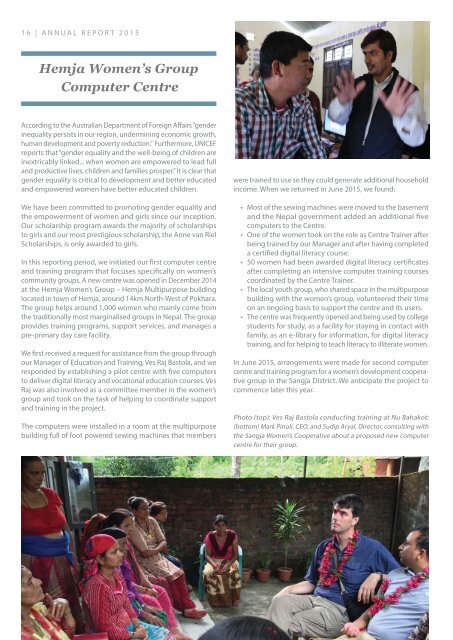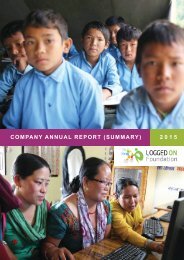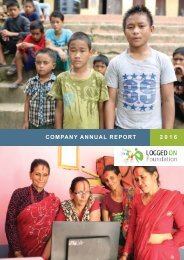Annual Report Summary 2015
Create successful ePaper yourself
Turn your PDF publications into a flip-book with our unique Google optimized e-Paper software.
16 | ANNUAL REPORT <strong>2015</strong><br />
Hemja Women’s Group<br />
Computer Centre<br />
According to the Australian Department of Foreign Affairs “gender<br />
inequality persists in our region, undermining economic growth,<br />
human development and poverty reduction.” Furthermore, UNICEF<br />
reports that “gender equality and the well-being of children are<br />
inextricably linked... when women are empowered to lead full<br />
and productive lives, children and families prosper.” It is clear that<br />
gender equality is critical to development and better educated<br />
and empowered women have better educated children.<br />
We have been committed to promoting gender equality and<br />
the empowerment of women and girls since our inception.<br />
Our scholarship program awards the majority of scholarships<br />
to girls and our most prestigious scholarship, the Anne van Riel<br />
Scholarships, is only awarded to girls.<br />
In this reporting period, we initiated our first computer centre<br />
and training program that focuses specifically on women’s<br />
community groups. A new centre was opened in December 2014<br />
at the Hemja Women’s Group – Hemja Multipurpose building<br />
located in town of Hemja, around 14km North-West of Pokhara.<br />
The group helps around 1,000 women who mainly come from<br />
the traditionally most marginalised groups in Nepal. The group<br />
provides training programs, support services, and manages a<br />
pre-primary day care facility.<br />
We first received a request for assistance from the group through<br />
our Manager of Education and Training, Ves Raj Bastola, and we<br />
responded by establishing a pilot centre with five computers<br />
to deliver digital literacy and vocational education courses. Ves<br />
Raj was also involved as a committee member in the women’s<br />
group and took on the task of helping to coordinate support<br />
and training in the project.<br />
The computers were installed in a room at the multipurpose<br />
building full of foot powered sewing machines that members<br />
were trained to use so they could generate additional household<br />
income. When we returned in June <strong>2015</strong>, we found:<br />
• Most of the sewing machines were moved to the basement<br />
and the Nepal government added an additional five<br />
computers to the Centre.<br />
• One of the women took on the role as Centre Trainer after<br />
being trained by our Manager and after having completed<br />
a certified digital literacy course.<br />
• 50 women had been awarded digital literacy certificates<br />
after completing an intensive computer training courses<br />
coordinated by the Centre Trainer.<br />
• The local youth group, who shared space in the multipurpose<br />
building with the women’s group, volunteered their time<br />
on an ongoing basis to support the centre and its users.<br />
• The centre was frequently opened and being used by college<br />
students for study, as a facility for staying in contact with<br />
family, as an e-library for information, for digital literacy<br />
training, and for helping to teach literacy to illiterate women.<br />
In June <strong>2015</strong>, arrangements were made for second computer<br />
centre and training program for a women’s development cooperative<br />
group in the Sangja District. We anticipate the project to<br />
commence later this year.<br />
Photo (top): Ves Raj Bastola conducting training at Nu Bahakot;<br />
(bottom) Mark Pinoli, CEO, and Sudip Aryal, Director, consulting with<br />
the Sangja Women’s Cooperative about a proposed new computer<br />
centre for their group.






